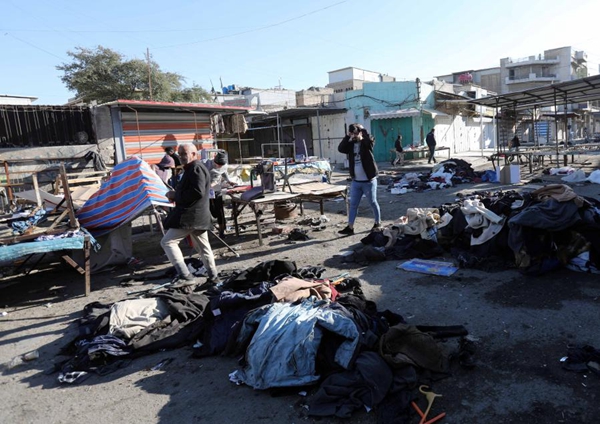Rare twin suicide bombings in Baghdad kill at least 32, wound 110
 0 Comment(s)
0 Comment(s) Print
Print E-mail Xinhua, January 22, 2021
E-mail Xinhua, January 22, 2021

A rare twin suicide bomb attacks in central Baghdad on Thursday morning killed up to 32 and wounded 110 others, breaking months of relative calm in the Iraqi capital, security sources and Iraqi Health Ministry said.
An Interior Ministry source anonymously told Xinhua that a suicide bomber blew up his explosive belt in a crowded market in Bab al-Sharji area, and a second one detonated his a few minutes later in the same market.
Further details appeared later when Interior Ministry spokesman Khalid al-Mahana said in a press release that the first suicide bomber blew up his explosive belt in a bustling outdoor market for second-hand clothes in Bab al-Sharji area after he claimed he was sick and people gathered to help him.
The second suicide bomber detonated his explosive belt a few minutes later in the same market as people gathered to evacuate the victims of the first blast, al-Mahana said.
Iraqi Health Minister Hassan al-Tamimi said in a statement that Baghdad's hospitals received 32 bodies, while 110 wounded people were admitted for treatment.
"Most of the wounded received treatment and left the hospitals, and only 36 remain for further treatment," al-Tamimi added.
Iraqi security forces cordoned off the area and blocked many streets leading to the scene, while ambulances and civilian cars evacuated the wounded to nearby hospitals and medical centers.
Yahia Rasoul, spokesman of the commander-in-chief of the Iraqi forces said in a press release during his visit to the wounded in Baghdad hospitals that "the security forces have information about the suicide bombers and have been chasing them before the explosions, but it seems that this is what prompted them to quickly blow themselves up."
Rasoul pledged to reach those who planned and prepared for the suicide attacks.
Meanwhile, Iraqi Prime Minister Mustafa al-Kadhimi, also commander-in-chief of the Iraqi forces, chaired an emergency meeting with security and intelligence commanders at Baghdad Operations Command to discuss the recent security breach, according to al-Kadhimi's media office.
Al-Kadhimi launched an investigation into the incident and ordered to hunt down the terrorist cells that facilitated the arrival of the suicide bombers, the statement said.
He said that the attack on civilians "confirms the continuation of our war against terrorism and that there is no retreat in the fight to eliminate its remnants in every inch of Iraq," the statement said.
Al-Kadhimi pledged to make changes in the security forces responsible for the security breach in Baghdad, it added.
Iraqi President Barham Salih said in a tweet on Twitter that the timing of these two "terrorist attacks confirms the terrorist groups' efforts to target the country's major political steps," referring to the country's early elections slated for Oct. 10, 2021.
For his part, Iraqi Minister of Foreign Affairs Fuad Hussein said in a press release, after the suicide bombings in Baghdad, "the continuing regional tension affects the internal security situation in Iraq."
He said that the militants of the extremist Islamic State (IS) group "are actively moving in several Iraqi areas, and the internal threat is still present."
No group has claimed responsibility for the attack, but the militants of the extremist Islamic State (IS) group, in most cases, are responsible for such suicide attacks targeting security forces and crowded areas including markets, cafes, and mosques across Iraq.
After years of deadly violence in Iraq after the U.S.-led invasion in 2003, massive suicide bombings have become rare in Baghdad, as the security situation has relatively improved in Iraq since the Iraqi security forces fully defeated IS militants across the country late in 2017.
However, sporadic deadly incidents still occur in the war-ravaged country as IS remnants have since melted into urban areas or deserts and rugged areas, carrying out frequent guerilla attacks against security forces and civilians.






Go to Forum >>0 Comment(s)